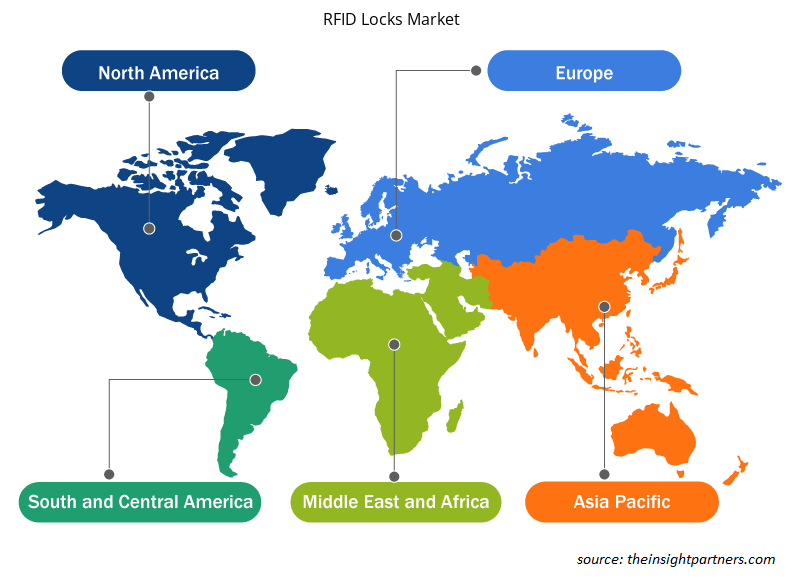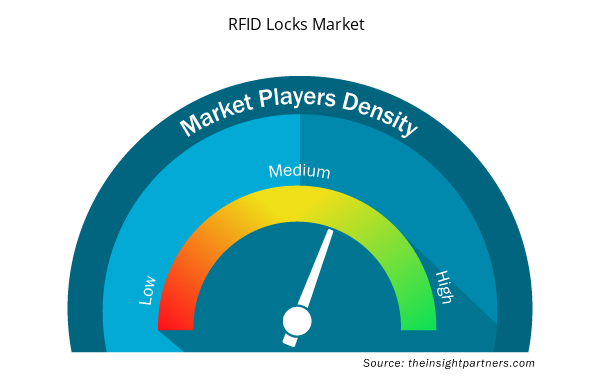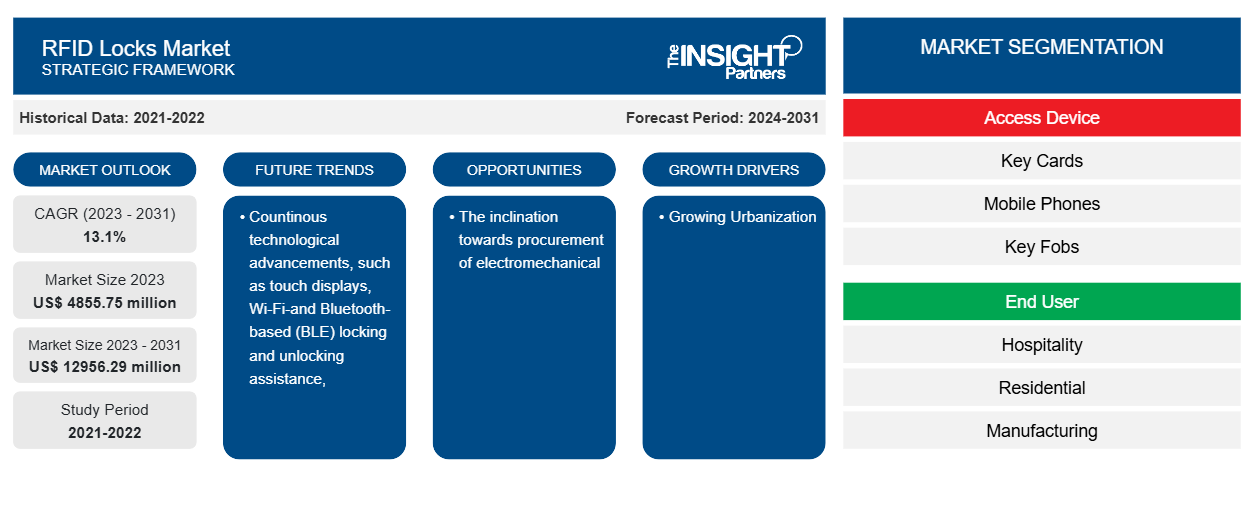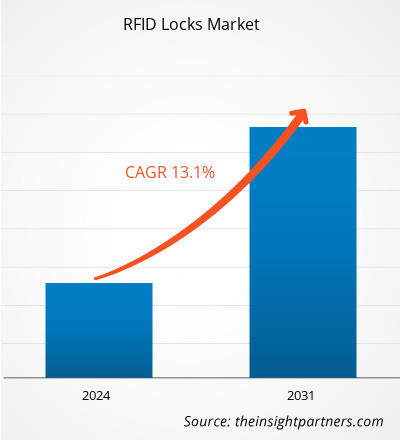RFID 锁市场规模预计将从 2023 年的 48.5575 亿美元增至 2031 年的 129.5629 亿美元。预计 2023-2031 年市场复合年增长率将达到 13.1%。触摸显示屏、Wi-Fi 和基于蓝牙 (BLE) 的锁定和解锁辅助等持续的技术进步可能仍是洞察市场趋势的关键系统。
RFID 锁市场分析
各种因素,尤其是全球酒店和旅游业的扩张,正在推动包括酒店在内的新商业建筑的建设。REID 门锁的扩张直接受到建造更多房间的酒店计划和政府增加对酒店业的融资的推动,从而促进了市场的扩张。推动对改进的出入解决方案的需求的核心因素之一是城市化。由于城市化创造了更多人口超过一百万的城市群和城市,对日益复杂和先进的基础设施解决方案的需求正在增长。这一因素也极大地促进了市场的扩张。
RFID 概述
使用射频卡作为钥匙的电子锁称为RFID锁或识别卡锁。老式的接触式卡需要与读卡器进行物理接触才能打开锁;使用RFID技术,RFID卡可以非接触式打开锁。RFID技术使用电磁波作为识别系统的一部分来传送信号。此外,由于其传统概念和高成本,RFID锁系统不用于替代家用机械锁。此外,RFID门锁的实时性能可能成功,也可能失败。
定制此报告以满足您的需求
您可以免费定制任何报告,包括本报告的部分内容、国家级分析、Excel 数据包,以及为初创企业和大学提供优惠和折扣
- 获取此报告的关键市场趋势。这个免费样品将包括数据分析,从市场趋势到估计和预测。
RFID 驱动因素和机遇
城市化进程加快
全球人口增长和农村向城市迁移的增加推动了城市化的上升趋势。欠发达国家的城市人口增长率低于高度发达国家。人们四处寻找新的工作、住房和零售空间,这就需要建筑物内配备门禁和安全系统,以阻止不速之客。越来越多的住宅、办公室、酒店、仓库和其他场所正在使用智能锁系统。此外,由于不再需要携带钥匙或记住密码,触摸板数字锁、指纹锁、REID 卡和其他智能锁的发展为消费者提供了更多便利。住宅和商业部门显然看到了门禁安全解决方案的增加。
与传统锁定系统相比,更倾向于采购机电产品
与传统锁定系统相比,人们对机电产品的偏好急剧增加,预计这一趋势将持续下去,为智能锁定系统的用户提供各种增长选择。REID 锁市场提供的一些特点是符合人体工程学的设计、非常适合的设计、符合 ADA 标准、通用性和灵活性,这增加了它们在企业(尤其是酒店)中的受欢迎程度。许多住宅、公寓、学校、小型商业建筑和其他类似场所的外门和内门仍然使用传统的钥匙和门把手锁。由于城市化进程加快和安全需求增加,智能锁定解决方案在公司所有者和房主中越来越受欢迎。因此,为了使他们的电子锁更加智能,锁具制造商正在将智能技术集成到其中。因此,在预测期内,倾向于采购机电产品而不是传统锁定系统预计将为 RFID 参与者带来新的机会。
RFID 报告分段分析
有助于得出 RFID 分析的关键部分是应用程序和最终用户。
根据最终用户,RFID 分为酒店、住宅、制造业、零售业、汽车业、航空航天和国防、政府和公共事业等。
RFID 份额分析(按地区)
RFID 报告的地理范围主要分为五个区域:北美、亚太地区、欧洲、中东和非洲以及南美/南美和中美洲。RFID 和 NFC 门锁等先进安全技术在亚太地区越来越为人所知,尤其是在家庭安全应用方面。此外,各大公司正在中国和日本等发展中国家进行投资,这推动了对经济实惠的解决方案的需求,这些解决方案有助于实现有效的访问控制。在整个预测期内,由于这项投资和先进安全解决方案的广泛使用,预计亚太地区的市场将增长。
RFID 报告范围
RFID 新闻和最新发展
RFID 的评估是通过收集主要和次要研究后的定性和定量数据进行的,其中包括重要的公司出版物、协会数据和数据库。以下是言语和语言障碍市场的发展和策略列表:
- 2022 年 8 月,Kalahari Resorts & Conventions 采用了 Assa Abloy Global Solutions 的 RFID 门锁技术和 Visionline 门禁管理系统。客人只需佩戴 RFID 腕带或钥匙卡,即可进入房间、进入其他度假村并购买物品,而无需随身携带个人信用卡或现金。
(来源:卡拉哈里度假村及会议中心新闻稿)
- 2021 年 9 月,霍尼韦尔收购了私人控股的 Performix Inc.。此次收购建立在霍尼韦尔的战略基础之上,即为生命科学行业的客户打造全球领先的集成软件平台,帮助他们实现更快的合规性、更高的可靠性和更高的产量。
(来源:霍尼韦尔,新闻稿)
RFID 锁市场区域洞察
Insight Partners 的分析师已详细解释了预测期内影响 RFID 锁市场的区域趋势和因素。本节还讨论了北美、欧洲、亚太地区、中东和非洲以及南美和中美洲的 RFID 锁市场细分和地理位置。

- 获取 RFID 锁市场的区域特定数据
RFID 锁市场报告范围
| 报告属性 | 细节 |
|---|---|
| 2023 年的市场规模 | 48.5575亿美元 |
| 2031 年市场规模 | 129.5629亿美元 |
| 全球复合年增长率(2023 - 2031) | 13.1% |
| 史料 | 2021-2022 |
| 预测期 | 2024-2031 |
| 涵盖的领域 | 按访问设备
|
| 覆盖地区和国家 | 北美
|
| 市场领导者和主要公司简介 |
|
RFID 锁市场参与者密度:了解其对业务动态的影响
RFID 锁市场正在快速增长,这得益于终端用户需求的不断增长,这些需求源于消费者偏好的不断变化、技术进步以及对产品优势的认识不断提高等因素。随着需求的增加,企业正在扩大其产品范围,进行创新以满足消费者的需求,并利用新兴趋势,从而进一步推动市场增长。
市场参与者密度是指在特定市场或行业内运营的企业或公司的分布情况。它表明在给定市场空间中,相对于其规模或总市场价值,有多少竞争对手(市场参与者)存在。
在 RFID 锁市场运营的主要公司有:
- 亚萨合莱公司
- 百福股份有限公司
- Digilock(Security People Inc.)
- Dormakaba 集团
- Euro-locks SA NV(Lowe 和 Fletcher 集团)
- Godrej 和 Boyce 制造有限公司
免责声明:上面列出的公司没有按照任何特定顺序排列。

- 获取 RFID 锁市场顶级关键参与者概览
RFID 锁市场报告覆盖范围和交付成果
“RFID 锁市场规模和预测(2021-2031)”报告对市场进行了详细分析,涵盖以下领域:
- 范围内所有主要细分市场的全球、区域和国家层面的市场规模和预测
- 市场动态,如驱动因素、限制因素和关键机遇
- 未来的主要趋势
- 详细的 PEST/波特五力分析和 SWOT 分析
- 全球和区域市场分析涵盖关键市场趋势、主要参与者、法规和最新市场发展
- 行业格局和竞争分析,涵盖市场集中度、热点图分析、知名参与者和最新发展
- 详细的公司简介
- 历史分析(2 年)、基准年、预测(7 年)及复合年增长率
- PEST 和 SWOT 分析
- 市场规模价值/数量 - 全球、区域、国家
- 行业和竞争格局
- Excel 数据集


- Nuclear Decommissioning Services Market
- Environmental Consulting Service Market
- Hand Sanitizer Market
- MEMS Foundry Market
- Hydrocephalus Shunts Market
- Artwork Management Software Market
- Non-Emergency Medical Transportation Market
- Fish Protein Hydrolysate Market
- Ketogenic Diet Market
- Cosmetic Bioactive Ingredients Market

Report Coverage
Revenue forecast, Company Analysis, Industry landscape, Growth factors, and Trends

Segment Covered
This text is related
to segments covered.

Regional Scope
North America, Europe, Asia Pacific, Middle East & Africa, South & Central America

Country Scope
This text is related
to country scope.
常见问题
The key players holding majority shares in the global RFID locks market are Assa Abloy AB, Bai Fu Co. Ltd, Digilock (Security People Inc.), Dormakaba Group, and Euro-locks SA NV (Lowe and Fletcher Group).
The global RFID locks market is expected to reach US$ 12956.29 million by 2031.
The global RFID locks market was estimated to be US$ 4855.75 million in 2023 and is expected to grow at a CAGR of 13.1 % during the forecast period 2023 - 2031.
The increasing demand for real-time data analytics, the Increasing use of big data and analytics and the inclination towards procurement of electromechanical products over traditional locking systems are the major factors that propel the global RFID locks market.
Continuous technological advancements, such as touch displays and Wi-Fi and Bluetooth-based (BLE) locking and unlocking assistance, are anticipated to play a significant role in the global RFID locks market in the coming years.
Trends and growth analysis reports related to Electronics and Semiconductor : READ MORE..
The Insight Partners performs research in 4 major stages: Data Collection & Secondary Research, Primary Research, Data Analysis and Data Triangulation & Final Review.
- Data Collection and Secondary Research:
As a market research and consulting firm operating from a decade, we have published and advised several client across the globe. First step for any study will start with an assessment of currently available data and insights from existing reports. Further, historical and current market information is collected from Investor Presentations, Annual Reports, SEC Filings, etc., and other information related to company’s performance and market positioning are gathered from Paid Databases (Factiva, Hoovers, and Reuters) and various other publications available in public domain.
Several associations trade associates, technical forums, institutes, societies and organization are accessed to gain technical as well as market related insights through their publications such as research papers, blogs and press releases related to the studies are referred to get cues about the market. Further, white papers, journals, magazines, and other news articles published in last 3 years are scrutinized and analyzed to understand the current market trends.
- Primary Research:
The primarily interview analysis comprise of data obtained from industry participants interview and answers to survey questions gathered by in-house primary team.
For primary research, interviews are conducted with industry experts/CEOs/Marketing Managers/VPs/Subject Matter Experts from both demand and supply side to get a 360-degree view of the market. The primary team conducts several interviews based on the complexity of the markets to understand the various market trends and dynamics which makes research more credible and precise.
A typical research interview fulfils the following functions:
- Provides first-hand information on the market size, market trends, growth trends, competitive landscape, and outlook
- Validates and strengthens in-house secondary research findings
- Develops the analysis team’s expertise and market understanding
Primary research involves email interactions and telephone interviews for each market, category, segment, and sub-segment across geographies. The participants who typically take part in such a process include, but are not limited to:
- Industry participants: VPs, business development managers, market intelligence managers and national sales managers
- Outside experts: Valuation experts, research analysts and key opinion leaders specializing in the electronics and semiconductor industry.
Below is the breakup of our primary respondents by company, designation, and region:

Once we receive the confirmation from primary research sources or primary respondents, we finalize the base year market estimation and forecast the data as per the macroeconomic and microeconomic factors assessed during data collection.
- Data Analysis:
Once data is validated through both secondary as well as primary respondents, we finalize the market estimations by hypothesis formulation and factor analysis at regional and country level.
- Macro-Economic Factor Analysis:
We analyse macroeconomic indicators such the gross domestic product (GDP), increase in the demand for goods and services across industries, technological advancement, regional economic growth, governmental policies, the influence of COVID-19, PEST analysis, and other aspects. This analysis aids in setting benchmarks for various nations/regions and approximating market splits. Additionally, the general trend of the aforementioned components aid in determining the market's development possibilities.
- Country Level Data:
Various factors that are especially aligned to the country are taken into account to determine the market size for a certain area and country, including the presence of vendors, such as headquarters and offices, the country's GDP, demand patterns, and industry growth. To comprehend the market dynamics for the nation, a number of growth variables, inhibitors, application areas, and current market trends are researched. The aforementioned elements aid in determining the country's overall market's growth potential.
- Company Profile:
The “Table of Contents” is formulated by listing and analyzing more than 25 - 30 companies operating in the market ecosystem across geographies. However, we profile only 10 companies as a standard practice in our syndicate reports. These 10 companies comprise leading, emerging, and regional players. Nonetheless, our analysis is not restricted to the 10 listed companies, we also analyze other companies present in the market to develop a holistic view and understand the prevailing trends. The “Company Profiles” section in the report covers key facts, business description, products & services, financial information, SWOT analysis, and key developments. The financial information presented is extracted from the annual reports and official documents of the publicly listed companies. Upon collecting the information for the sections of respective companies, we verify them via various primary sources and then compile the data in respective company profiles. The company level information helps us in deriving the base number as well as in forecasting the market size.
- Developing Base Number:
Aggregation of sales statistics (2020-2022) and macro-economic factor, and other secondary and primary research insights are utilized to arrive at base number and related market shares for 2022. The data gaps are identified in this step and relevant market data is analyzed, collected from paid primary interviews or databases. On finalizing the base year market size, forecasts are developed on the basis of macro-economic, industry and market growth factors and company level analysis.
- Data Triangulation and Final Review:
The market findings and base year market size calculations are validated from supply as well as demand side. Demand side validations are based on macro-economic factor analysis and benchmarks for respective regions and countries. In case of supply side validations, revenues of major companies are estimated (in case not available) based on industry benchmark, approximate number of employees, product portfolio, and primary interviews revenues are gathered. Further revenue from target product/service segment is assessed to avoid overshooting of market statistics. In case of heavy deviations between supply and demand side values, all thes steps are repeated to achieve synchronization.
We follow an iterative model, wherein we share our research findings with Subject Matter Experts (SME’s) and Key Opinion Leaders (KOLs) until consensus view of the market is not formulated – this model negates any drastic deviation in the opinions of experts. Only validated and universally acceptable research findings are quoted in our reports.
We have important check points that we use to validate our research findings – which we call – data triangulation, where we validate the information, we generate from secondary sources with primary interviews and then we re-validate with our internal data bases and Subject matter experts. This comprehensive model enables us to deliver high quality, reliable data in shortest possible time.


 获取此报告的免费样本
获取此报告的免费样本